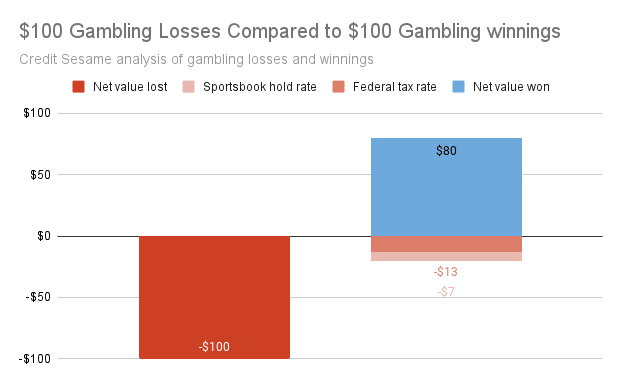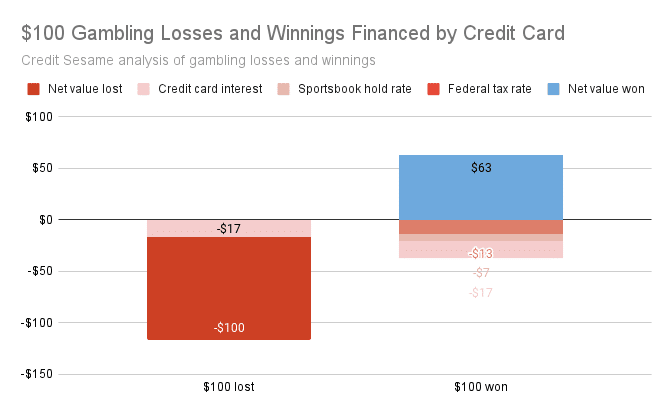Credit Sesame outlines the dangers of student gambling.
Of all the things a college student may learn this semester, the toughest lesson might be about student gambling.
Recent years have seen sports gambling in particular come out of the shadows and into the mainstream. It’s especially popular among young adults, who are clearly the targets of sportsbook advertising campaigns.
Perhaps there’s nothing wrong with gambling as an occasional form of entertainment. However, for young adults gambling often mixes with inexperience, excitement over live sporting events, lack of supervision and peer pressure. The result can be addictive behavior and long-lasting money problems.
According to analysis by The Recovery Village, an addiction treatment organization, the rate of compulsive gambling among college students is about twice that of the overall adult population. 1 in 20 college students exhibit the symptoms of compulsive gambling.
Given that number, if you look at a typical college classroom chances are there’s a problem gambler in there. Student gambling is a thing. How do you like those odds?
After all, odds are what student gambling, or any kind of gambling, is all about. College students are entitled to make a personal choice about whether or not to gamble, but any good gambler has to understand the odds. So this article looks at the issue of gambling from the standpoint of what college students should know about the odds.
The odds are not on your side
In the simplest terms, if you and a friend bet on the flip of a coin, each of you has an equal chance of winning or losing. A $100 win would be balanced by a $100 loss. Theoretically, if you repeated the bet often enough you’d break even.
The reality of organized betting is different. First of all, the organization running the game is going to want to take a cut.
The amount of money a sportsbook retains from bets taken in after paying out to winners is known as the hold. Because of the hold, the amount paid out to winners does not offset the dollar value of losing bets.
Winnings take another hit from taxes. Gambling winnings are taxable. The taxable amount can be offset by gambling losses, but only if they occurred in the same tax year. The deduction for losses cannot be carried forward to subsequent years, and it cannot be applied against other taxable income like wages or investment gains.
In other words, if you have a winning year, taxes reduce your proceeds. If you have a losing year though, you’re on the hook for every penny of those losses.
The odds get even worse if you use credit card debt to finance your gambling. If you lose, or even if you don’t win right away, you add credit card interest to the cost of playing.
How the numbers are stacked against student gambling
The notion that gambling is a level playing field, where you have an even chance of winning $100 or losing $100, does not stand up to the realities described above. The sportsbook’s hold, taxes and credit card debt can all stack the odds against you.
Here’s how the numbers work out. According to the National Conference of State Legislators, the average hold among sportsbooks is 7.2%. So, for every $100 lost, the offsetting amount of gambling winnings is reduced by $7.20.
Then come the taxes. According to the IRS, the average federal effective tax rate is 13.29%. So, taxes reduce $100 in net winnings by $13.29. The tax bill would be higher in states with an income tax.
Based on those two factors, here’s how $100 in gambling losses compares to $100 winnings.

The odds become more uneven when you consider people who incur credit card debt to finance their gambling. Here’s how $100 in net gambling losses would be offset by $100 winnings in that scenario:

Taking all those cost factors into consideration, $100 in losses is typically offset by only $63 in winnings. At those odds, you’d have to win over 60% of your bets just to break even.
Your chances of doing that are especially poor if you participate in so-called “sucker bets” like parleys. These involve stringing together a series of bets, all of which have to be correct for you to win the parley bet.
Most gamblers know that there are long odds against getting all the component bets in a parley right, but they are lured by the fact that these bets have higher payouts than single-game bets. What many don’t realize is that the winning payouts are nowhere near as high as the losses and the odds are stacked against you winning.
There’s a profit motive to prey on college students
When it comes to gambling, college students are up against more than the odds of the game itself. There are a lot of powerful entities with a strong profit motive to convince them to gamble.
Gambling is a multi-billion dollar business. If you’ve ever seen how big and lush some casinos are, or watched the constant barrage of gambling commercials on sports broadcasts, you recognize that there’s a lot of money behind the industry.
Normally, you might expect the government to protect you from predatory business practices, but now that several states have legalized gambling they earn millions of dollars in tax revenues from it. They don’t have a strong motivation to shut the legal games down.
Even your college may be on the other side of the game from its students. A couple years ago, Sports Illustrated reported that the University of Colorado had reached a $1.625 million advertising deal with PointsBet, a sports gambling company.
If a college subjecting its students to gambling advertising doesn’t bother you, consider this. As part of the deal, the college would reportedly also get $30 for every new customer it referred to PointsBet. In other words, the college would get a bounty every time it convinced another one of its students to gamble.
When student gambling stops being fun
When done casually gambling is a recreational activity enjoyed by millions of Americans. For some though, it reaches a point where it stops being fun.
Gambling losses can be particularly harmful for college students. Many are struggling to pay their college bills. Serious gambling losses could force them to drop out, perhaps permanently damaging their career prospects.
Also, college students are just starting to build their credit histories. Heavy debts and trouble making payments could quickly give them a terrible credit record.
Those records can take years to improve. In the meantime, a person with damaged credit would pay more to use credit and have access to credit restricted. Bad credit may even limit their job and housing opportunities.
Here are some signs that gambling is no longer harmless fun:
- You’ve lost time from work or school because of gambling
- Gambling has affected your reputation
- You sometimes gamble to try to pay debts
- Losing makes you feel you need to bet more to break even
- You’ve sold possessions or borrowed money in order to gamble
- You sometimes spend more time or money gambling than you’d planned
- You’ve lost sleep over gambling
- You’ve considered committing a crime to finance gambling
- Gambling has damaged personal relationships
If you think you might have a problem, there are organizations like Gamblers Anonymous that can help.
If you don’t have a gambling problem and are thinking of making a few bets, at least know the odds before you put your money down. Once you consider those odds, you may thing twice about getting started.
You may also be interested in:
- How to Build Credit as a Student
- Student Freebies, Hacks and Discounts
- 8 Ways to Make the Most of the New Student Loan Debt Relief Program
Disclaimer: The article and information provided here is for informational purposes only and is not intended as a substitute for professional advice.




















